Elijah David's Blog, page 4
May 7, 2018
Monday Musings: A Monster Calls Review
Last week I picked up a book I'd heard about but never looked into for myself: A Monster Calls. I'd recently bought a copy at our local used book store and after some rousing recommendations from friends I decided I wanted to read it sooner rather than later.
Reader beware: SPOILERS abound.
 It's the movie cover, but it's gorgeous and it's the copy I read.
It's the movie cover, but it's gorgeous and it's the copy I read.
A Monster Calls has one of the best opening lines I've read in a while: "The monster shows up just after midnight. As they do."
(Apparently, this is something of a trope in stories now; follow-up a sentence about extraordinary things with the statement "as you/they do" as though it's perfectly normal. I've heard it used that way in real life, but this was the first time I encountered it in fiction.)
From there we're introduced to Conor, a 13-year-old boy with a cancer-stricken mum (this is the UK after all) and a recurring nightmare whose ending he won't even let himself think about. One night, after Conor wakens from the nightmare, a monster appears outside his bedroom window. Appearing to take shape from the old yew tree at the top of the hill, it declares, "I have had as many names as there are years to time itself! I am Herne the hunter! I am Cernunnos! I am the eternal Green Man!" (p. 36) *
Conor, however, is less than impressed. He's seen worse in his dreams (if this isn't just another nightmare brought on by the stress of his mum's illness).
But the monster isn't finished.
It's going to tell him three stories about other times it has come walking the earth. And then it expects Conor to tell a story. Conor's story. Conor's truth.
In between the monster's visits (not all of which are at night), Conor has to deal with schoolyard bullies, his ex-best-friend Lily's attempts to check up on him, his absentee father, and his decidedly un-grandmotherly grandma. To say nothing of his mother and the treatments that seem to be working less well than usual.
With sparse prose that elicits emotion, Ness weaves Conor's story in some surprisingly human directions, revealing Conor's "truth" slowly and deliberately. While some of the secondary characters lack development, readers can forgive this in light of Conor's own growth in the story.
I'll admit that when the monster said it wanted Conor's "truth," I pulled back from the story a little. I don't usually find stories that emphasize a personal truth over an objective truth worthwhile in the end, largely due to the lack of foundation such philosophies seem to have.
In this case, however, Conor's truth is a universal one: that sometimes we just want our loved ones' struggles with illness to be over, even if it means they die rather than recover. Conor feels extremely guilty for thinking (even in his dreams) that it would be better for his mother to die than to keep suffering under the chemotherapy. (His guilt pops up every time someone doesn't punish him for breaking the rules or failing to complete his responsibilities or even when the school bullies target him.)
In the end, I was deeply moved by the book's prose, its emotional resonance, and its willingness to look long and hard at some of the messy aspects of life without wallowing in the mess. I also appreciated Lily's maturity in the way she reaches out to Conor near the end. Her willingness to apologize and attempt to restore the relationship when everyone else begins to pull away made me smile even as the finale of the book broke my heart.
* And yes, I did a little jig when I read this line because I kind of like Cernunnos in fiction. I blame Susan Cooper's The Dark is Rising for starting this.
If you haven't read A Monster Calls, I recommend getting it ASAP. If you have read it, let me know what you thought. Have you had to face your own version of Conor's truth?
Reader beware: SPOILERS abound.
 It's the movie cover, but it's gorgeous and it's the copy I read.
It's the movie cover, but it's gorgeous and it's the copy I read.A Monster Calls has one of the best opening lines I've read in a while: "The monster shows up just after midnight. As they do."
(Apparently, this is something of a trope in stories now; follow-up a sentence about extraordinary things with the statement "as you/they do" as though it's perfectly normal. I've heard it used that way in real life, but this was the first time I encountered it in fiction.)
From there we're introduced to Conor, a 13-year-old boy with a cancer-stricken mum (this is the UK after all) and a recurring nightmare whose ending he won't even let himself think about. One night, after Conor wakens from the nightmare, a monster appears outside his bedroom window. Appearing to take shape from the old yew tree at the top of the hill, it declares, "I have had as many names as there are years to time itself! I am Herne the hunter! I am Cernunnos! I am the eternal Green Man!" (p. 36) *
Conor, however, is less than impressed. He's seen worse in his dreams (if this isn't just another nightmare brought on by the stress of his mum's illness).
But the monster isn't finished.
It's going to tell him three stories about other times it has come walking the earth. And then it expects Conor to tell a story. Conor's story. Conor's truth.
In between the monster's visits (not all of which are at night), Conor has to deal with schoolyard bullies, his ex-best-friend Lily's attempts to check up on him, his absentee father, and his decidedly un-grandmotherly grandma. To say nothing of his mother and the treatments that seem to be working less well than usual.
With sparse prose that elicits emotion, Ness weaves Conor's story in some surprisingly human directions, revealing Conor's "truth" slowly and deliberately. While some of the secondary characters lack development, readers can forgive this in light of Conor's own growth in the story.
I'll admit that when the monster said it wanted Conor's "truth," I pulled back from the story a little. I don't usually find stories that emphasize a personal truth over an objective truth worthwhile in the end, largely due to the lack of foundation such philosophies seem to have.
In this case, however, Conor's truth is a universal one: that sometimes we just want our loved ones' struggles with illness to be over, even if it means they die rather than recover. Conor feels extremely guilty for thinking (even in his dreams) that it would be better for his mother to die than to keep suffering under the chemotherapy. (His guilt pops up every time someone doesn't punish him for breaking the rules or failing to complete his responsibilities or even when the school bullies target him.)
In the end, I was deeply moved by the book's prose, its emotional resonance, and its willingness to look long and hard at some of the messy aspects of life without wallowing in the mess. I also appreciated Lily's maturity in the way she reaches out to Conor near the end. Her willingness to apologize and attempt to restore the relationship when everyone else begins to pull away made me smile even as the finale of the book broke my heart.
* And yes, I did a little jig when I read this line because I kind of like Cernunnos in fiction. I blame Susan Cooper's The Dark is Rising for starting this.
If you haven't read A Monster Calls, I recommend getting it ASAP. If you have read it, let me know what you thought. Have you had to face your own version of Conor's truth?
Published on May 07, 2018 10:54
May 1, 2018
Top 10 Books in My TBR Pile (Revisited)
Back in January I listed the books in my TBR pile/shelf that I was most looking forward to reading. This month, I'm going to update that list because a) I have read a few from that list and b) my reading desires change with the hour.
Cold Days by Jim Butcher
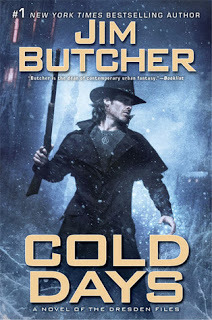
Now that I've read Changes and Ghost Story (and have given myself some time to recuperate), I'm ready to dive into the next Dresden Files book. I'm really interested to see where the series goes after the stunning duo that was books 12 and 13.
A Report from Group 17 by Robert C. O'Brien

This is the last book in the O'Brien read/watch series, and I've partly been holding off on it because after this, there will be no more new-to-me O'Brien books. Yes, there are the NIMH sequels written by his daughter, but still. I'm going to read it because I need to finish the series, but please don't be upset if it takes me a little longer.
The Witchwood Crown by Tad Williams
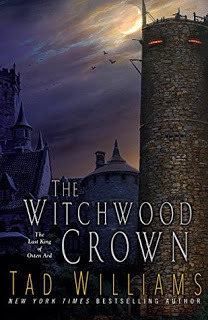
I think I might almost be ready to read an epic novel again. I really want to see what Williams does next with Osten Ard. At the same time, I know I'm going to be waiting a while for the sequel, so maybe waiting to start isn't a terrible thing?
The Devil's Only Friend by Dan Wells
Every time I finish a book, I pick this one up as a contender for "next read." And then I put it down because I'm not in the mood for dark and horror. But I'm going to finish this series. It just might be later this year when autumn starts to creep in.
Rose Daughter by Robin McKinley
This is actually one I've had on my shelf on and off for years. I read Beauty a long time ago, and I've been meaning to read McKinley's second take on "Beauty and the Beast" ever since. Then the bug to read all the B&B adaptations I own hit, and I've got two nice little stacks on the shelf (one for new reads and one for rereads).
The Brothers Karamazov by Fyodor Dostoevsky
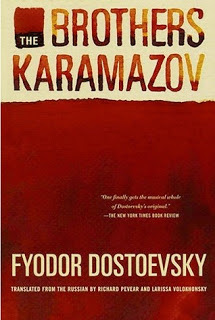
I've had this on my to-read list for years, not because it's a classic but because a friend of mine told me Alyosha was one of the characters he most identified me with and I felt like I should read the book so I could understand the reference better.
Uprooted by Naomi Novik

Yes, it's a reread, but I've been wanting to reread it since the first read and it's in my B&B stacks.
Till We Have Faces by C. S. Lewis

See comments for Uprooted. Only I've read this one a few times already. It's just time for a reread.
A Local Habitation by Seanan McGuire
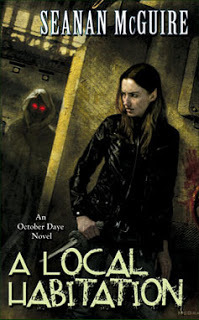
I know I was a little conflicted about the first book in this series yesterday, but my fingers slipped on the keyboard and I've got the second one coming on loan through the library. So I guess I'm reading it sooner rather than later.
The Hollow Boy by Jonathan Stroud

And speaking of library books, I need to get this one ordered. Making myself take a break from library books to focus on books I own was good, but I need to know what follows that cliffhanger, darn it!
Have you read any of these? What did you think? What books are highest on your to-read piles? Let me know in the comments!
Cold Days by Jim Butcher

Now that I've read Changes and Ghost Story (and have given myself some time to recuperate), I'm ready to dive into the next Dresden Files book. I'm really interested to see where the series goes after the stunning duo that was books 12 and 13.
A Report from Group 17 by Robert C. O'Brien

This is the last book in the O'Brien read/watch series, and I've partly been holding off on it because after this, there will be no more new-to-me O'Brien books. Yes, there are the NIMH sequels written by his daughter, but still. I'm going to read it because I need to finish the series, but please don't be upset if it takes me a little longer.
The Witchwood Crown by Tad Williams

I think I might almost be ready to read an epic novel again. I really want to see what Williams does next with Osten Ard. At the same time, I know I'm going to be waiting a while for the sequel, so maybe waiting to start isn't a terrible thing?
The Devil's Only Friend by Dan Wells

Every time I finish a book, I pick this one up as a contender for "next read." And then I put it down because I'm not in the mood for dark and horror. But I'm going to finish this series. It just might be later this year when autumn starts to creep in.
Rose Daughter by Robin McKinley

This is actually one I've had on my shelf on and off for years. I read Beauty a long time ago, and I've been meaning to read McKinley's second take on "Beauty and the Beast" ever since. Then the bug to read all the B&B adaptations I own hit, and I've got two nice little stacks on the shelf (one for new reads and one for rereads).
The Brothers Karamazov by Fyodor Dostoevsky

I've had this on my to-read list for years, not because it's a classic but because a friend of mine told me Alyosha was one of the characters he most identified me with and I felt like I should read the book so I could understand the reference better.
Uprooted by Naomi Novik

Yes, it's a reread, but I've been wanting to reread it since the first read and it's in my B&B stacks.
Till We Have Faces by C. S. Lewis

See comments for Uprooted. Only I've read this one a few times already. It's just time for a reread.
A Local Habitation by Seanan McGuire

I know I was a little conflicted about the first book in this series yesterday, but my fingers slipped on the keyboard and I've got the second one coming on loan through the library. So I guess I'm reading it sooner rather than later.
The Hollow Boy by Jonathan Stroud

And speaking of library books, I need to get this one ordered. Making myself take a break from library books to focus on books I own was good, but I need to know what follows that cliffhanger, darn it!
Have you read any of these? What did you think? What books are highest on your to-read piles? Let me know in the comments!
Published on May 01, 2018 07:53
April 30, 2018
Monday Musings: Reviews, Lorehaven, and Writing Updates
The title seems like a lot, but I'll try to keep it tidy.
First off, I finished reading a book for the first time in almost a month. Second, I completely missed a (couple of) review(s) at the end of March. Bad me.
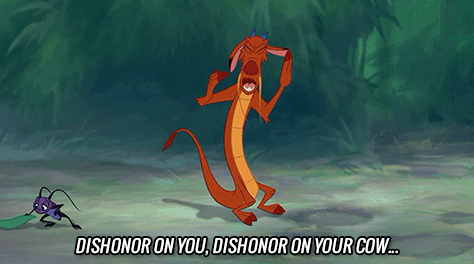
Anyway, here's to catching up.
ReviewsHellboy Vol. 6
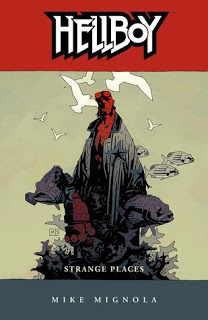
This collects two shorter stories following Hellboy's departure from the BPRD in volume 5. The first follows Hellboy's encounter with a trip of mermaids, who strike deals with a sea witch to gain their revenge on our hero. Needless to say, it doesn't end well for them. There's some really great heart in this story as there usually is in Mignola's stories. The other story follows in the aftermath of the first and features the return of Hecate, queen of witches. She tries to convince Hellboy to embrace his destiny. Again. As usual, he'll have none of it, though the epilogue makes it clear that he's going to have to face that destiny one way or another.
(I also read the first volume of The Wicked + The Divine but as it was basically a prolonged story featuring the elements I least admired in Sandman, I won't be reviewing it or continuing with the series. The art is well done, but I didn't care for the story.)
Rosemary and Rue

The first installment in Seanan McGuire's October Daye series, Rosemary and Rue gets off to a flying start by introducing half-Fae PI Toby Daye, who is currently missing time with her fiancé and young daughter to track down the people responsible for kidnapping her liege's wife and daughter. She finds the suspected villains, only to get herself cursed and turned into a fish. For fourteen years.
Jump ahead to the story's present day. Life isn't very sweet for someone who disappeared for over a decade. Toby's having trouble adjusting to life outside the pond. She won't see her contacts in Faerie. Her fellow changelings (half-Fae) can't seem to connect with her. Her daughter refuses to see her. And since she was legally declared dead, getting herself solid work is a trifle difficult.
To make things worse, one of her former frenemies from Faerie, Evening Winterrose, leaves a voicemail containing a death curse: a curse that traps Toby on the path to find out who killed Evening and why.
Toby's getting pulled back into Faerie whether she likes it or not.
This is a promising start to an urban fantasy mystery series (I confess that Dresden Files is my only real comparison, but I stand by my statement). It has action, world-building, strong characters, and plenty of setup for later books (in the form of relationships of all kinds, debts owed, and mysteries yet unsolved).
My biggest drawback is that the prologue is so disconnected from the rest of the novel's plot. The conflict (the liege's kidnapped family) is defused during Toby's absence, and the question of who kidnapped them remains unanswered (though it's teased this will become part of the larger story at play).
Likewise, Toby misses fourteen years of life with her daughter, Gilly, and only talks about this loss twice in the whole book (once when she catches us up to what life is like now, and once when it's relevant to the plot).
As a parent, I had a hard time with this seeming disconnect. Yes, Toby's facing assassins and a death curse and all kinds of complications (like a love pentagon). But I found it hard to believe that her loss of that time wouldn't be one of the things that weighed heaviest on her afterward. Especially with the loving and playful family dynamic McGuire introduces in the prologue. I wanted an entire novel of the prologue's set-up plot. It was gripping and endearing.
In the end, though, I was at least satisfied with the story McGuire told and will continue reading the series. (By the way, if you've read more of the October Daye series, I'd love to talk about it (as spoiler-free as possible, of course). I really want to know if we get more fallout from the prologue.)
Lorehaven

If you haven't caught wind of this elsewhere, I'm on the editorial staff of a new webzine called Lorehaven. Our mission is to connect readers to Christian speculative fiction, whether it's sci-fi, fantasy, horror, or anything in between. The magazine features reviews of the latest books in the genre, interviews with authors, tips for starting and running a local book club, and more. Issue 1 goes live today at www.lorehaven.com.
Writing UpdateI realize it's been a long while since I did a snippets post or even a general update on writing. I've not been entirely idle in that time. I just haven't had a lot to share with you. But here's where I stand.
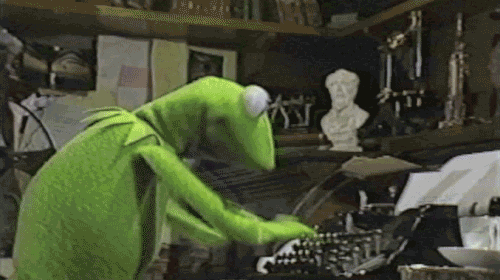
Albion Apparent is still in the editing stages. I'm applying all the feedback from my beta readers and getting it into the best shape I can before sending it to the publisher. Then we'll begin that process.
I've been doing a poem-a-day challenge in April, something a friend of mine introduced me to several years back. It's been good to try my hand at poetry again. The bug hits every year or two, and it's nice to express myself a little differently than is my wont. (If you're interested in reading this month's poems, just let me know.)
I've also written a short story for inclusion in a collection one of my local writing groups is putting together. If you want to beta this story, let me know in the comments. (My other writing group is also doing a collection, so I'll be putting together another story for that and opening it for beta once it's finished.)
First off, I finished reading a book for the first time in almost a month. Second, I completely missed a (couple of) review(s) at the end of March. Bad me.

Anyway, here's to catching up.
ReviewsHellboy Vol. 6

This collects two shorter stories following Hellboy's departure from the BPRD in volume 5. The first follows Hellboy's encounter with a trip of mermaids, who strike deals with a sea witch to gain their revenge on our hero. Needless to say, it doesn't end well for them. There's some really great heart in this story as there usually is in Mignola's stories. The other story follows in the aftermath of the first and features the return of Hecate, queen of witches. She tries to convince Hellboy to embrace his destiny. Again. As usual, he'll have none of it, though the epilogue makes it clear that he's going to have to face that destiny one way or another.
(I also read the first volume of The Wicked + The Divine but as it was basically a prolonged story featuring the elements I least admired in Sandman, I won't be reviewing it or continuing with the series. The art is well done, but I didn't care for the story.)
Rosemary and Rue

The first installment in Seanan McGuire's October Daye series, Rosemary and Rue gets off to a flying start by introducing half-Fae PI Toby Daye, who is currently missing time with her fiancé and young daughter to track down the people responsible for kidnapping her liege's wife and daughter. She finds the suspected villains, only to get herself cursed and turned into a fish. For fourteen years.
Jump ahead to the story's present day. Life isn't very sweet for someone who disappeared for over a decade. Toby's having trouble adjusting to life outside the pond. She won't see her contacts in Faerie. Her fellow changelings (half-Fae) can't seem to connect with her. Her daughter refuses to see her. And since she was legally declared dead, getting herself solid work is a trifle difficult.
To make things worse, one of her former frenemies from Faerie, Evening Winterrose, leaves a voicemail containing a death curse: a curse that traps Toby on the path to find out who killed Evening and why.
Toby's getting pulled back into Faerie whether she likes it or not.
This is a promising start to an urban fantasy mystery series (I confess that Dresden Files is my only real comparison, but I stand by my statement). It has action, world-building, strong characters, and plenty of setup for later books (in the form of relationships of all kinds, debts owed, and mysteries yet unsolved).
My biggest drawback is that the prologue is so disconnected from the rest of the novel's plot. The conflict (the liege's kidnapped family) is defused during Toby's absence, and the question of who kidnapped them remains unanswered (though it's teased this will become part of the larger story at play).
Likewise, Toby misses fourteen years of life with her daughter, Gilly, and only talks about this loss twice in the whole book (once when she catches us up to what life is like now, and once when it's relevant to the plot).
As a parent, I had a hard time with this seeming disconnect. Yes, Toby's facing assassins and a death curse and all kinds of complications (like a love pentagon). But I found it hard to believe that her loss of that time wouldn't be one of the things that weighed heaviest on her afterward. Especially with the loving and playful family dynamic McGuire introduces in the prologue. I wanted an entire novel of the prologue's set-up plot. It was gripping and endearing.
In the end, though, I was at least satisfied with the story McGuire told and will continue reading the series. (By the way, if you've read more of the October Daye series, I'd love to talk about it (as spoiler-free as possible, of course). I really want to know if we get more fallout from the prologue.)
Lorehaven

If you haven't caught wind of this elsewhere, I'm on the editorial staff of a new webzine called Lorehaven. Our mission is to connect readers to Christian speculative fiction, whether it's sci-fi, fantasy, horror, or anything in between. The magazine features reviews of the latest books in the genre, interviews with authors, tips for starting and running a local book club, and more. Issue 1 goes live today at www.lorehaven.com.
Writing UpdateI realize it's been a long while since I did a snippets post or even a general update on writing. I've not been entirely idle in that time. I just haven't had a lot to share with you. But here's where I stand.

Albion Apparent is still in the editing stages. I'm applying all the feedback from my beta readers and getting it into the best shape I can before sending it to the publisher. Then we'll begin that process.
I've been doing a poem-a-day challenge in April, something a friend of mine introduced me to several years back. It's been good to try my hand at poetry again. The bug hits every year or two, and it's nice to express myself a little differently than is my wont. (If you're interested in reading this month's poems, just let me know.)
I've also written a short story for inclusion in a collection one of my local writing groups is putting together. If you want to beta this story, let me know in the comments. (My other writing group is also doing a collection, so I'll be putting together another story for that and opening it for beta once it's finished.)
Published on April 30, 2018 04:00
April 23, 2018
Monday Musings: Portals
Yesterday's prompt for the April Fae art challenge was Portal. Since I've been doing a poem a day this month as well as the art challenge, I started brainstorming what a portal poem might be like -- and what portals have been special to me over the years.
The tendency in fantasy movies and shows like Once Upon a Time is to have a swirling vortex as the gateway between worlds. (I'm not immune to this image. In fact, the main method of inter-world travel in the Non de Velai books is a shimmering silver pool, though it often appears between two trees.) But the portals that appear in fiction are often more varied than that.
The first portal stories I can remember seeing were The Wizard of Oz and Alice in Wonderland. The portals in these stories are naturally occurring phenomena: a tornado/twister/cyclone (whatever term you prefer) and a rabbit hole. While tornadoes weren't common where I grew up (outside of hurricane season), holes in the ground were common enough. We had snakes, rabbits, moles, and all kinds of other burrowing creatures in northwest Florida (even if most of them avoided our backyard).
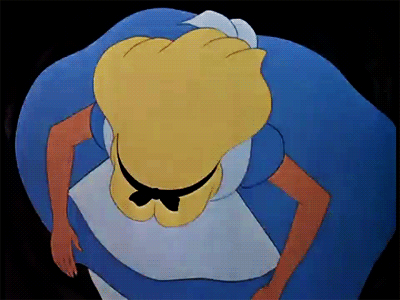
Although the idea of simply slipping through the right crack in the world always appealed to my imagination, the real portal that speaks volumes to my soul and my imagination is a door. (Even Alice walks through several doors on her adventures, even if the rabbit hole is the beginning.)
A wardrobe door. A cupboard door. A door to a place that's bigger on the inside.*
 This is me a couple years ago in Canada; we were at a theatre festival that was producing LWW onstage and the museum had a full exhibit on Narnia that began with the wardrobe door. Yes, it was magical.
This is me a couple years ago in Canada; we were at a theatre festival that was producing LWW onstage and the museum had a full exhibit on Narnia that began with the wardrobe door. Yes, it was magical.
Of course, Narnia isn't limited to the wardrobe. The children also travel through worlds via magic rings (another favorite of mine), the call of a horn, a painting (possibly the best entrance after the wardrobe), a door in a school wall (the closest Lewis comes to repeating an entrance style), and simply being snatched out of our world by Aslan's call.
This idea that the entrance to another world is probably right around the corner and just out of sight fires the imagination to create worlds to which we can travel. And authors keep returning to it for symbolic and plot-related reasons.
Neil Gaiman's Neverwhere (still my favorite of his works) features a main character who can create doors to other places anywhere she likes (though at the cost of personal exhaustion if she abuses the gift).
N.D. Wilson's 100 Cupboards series features multiple worlds and times reachable by doorways that range from the innocuous to the foreboding.
Harry Potter places the boundary between Muggle and Wizarding worlds on an ordinary train platform (though arguably the boundary between the worlds is more intangible and omnipresent).
Howl's Moving Castle uses a door that opens on multiple locations (and worlds) with the turn of a knob (a similar door appears in Mr. Magorium's Wonder Emporium).
Inkheart places the boundary between worlds on the tongues of gifted individuals who can speak words into life and vice versa.
In stories like The Secret Garden and Over the Garden Wall, the portal is simply a wall (or door) that needs to be breached/climbed (or opened), and the characters won't always realize at first that they've wandered into a different sort of story. (No, TSG is not a fantasy, but the garden itself serves as a secondary world within the story, especially for the characters.)
Alice even wanders through a mirror in the second book (something I didn't really discover until I saw the Hallmark version of the stories).
But whatever shape the portal takes, there's no denying it calls us to explore the realm of possibility and the depth of imagination.
What are some of your favorite portal stories? Are there any unique or bizarre portals that have stuck with you over the years? Let's talk about them!
* Though I confess that I rejected the TARDIS in my portal poem/musings because it was too recent an image to be foundational (for me). I'm far more likely to expect another world outside my front door than to spot a police box on the street.
The tendency in fantasy movies and shows like Once Upon a Time is to have a swirling vortex as the gateway between worlds. (I'm not immune to this image. In fact, the main method of inter-world travel in the Non de Velai books is a shimmering silver pool, though it often appears between two trees.) But the portals that appear in fiction are often more varied than that.
The first portal stories I can remember seeing were The Wizard of Oz and Alice in Wonderland. The portals in these stories are naturally occurring phenomena: a tornado/twister/cyclone (whatever term you prefer) and a rabbit hole. While tornadoes weren't common where I grew up (outside of hurricane season), holes in the ground were common enough. We had snakes, rabbits, moles, and all kinds of other burrowing creatures in northwest Florida (even if most of them avoided our backyard).

Although the idea of simply slipping through the right crack in the world always appealed to my imagination, the real portal that speaks volumes to my soul and my imagination is a door. (Even Alice walks through several doors on her adventures, even if the rabbit hole is the beginning.)
A wardrobe door. A cupboard door. A door to a place that's bigger on the inside.*
 This is me a couple years ago in Canada; we were at a theatre festival that was producing LWW onstage and the museum had a full exhibit on Narnia that began with the wardrobe door. Yes, it was magical.
This is me a couple years ago in Canada; we were at a theatre festival that was producing LWW onstage and the museum had a full exhibit on Narnia that began with the wardrobe door. Yes, it was magical.Of course, Narnia isn't limited to the wardrobe. The children also travel through worlds via magic rings (another favorite of mine), the call of a horn, a painting (possibly the best entrance after the wardrobe), a door in a school wall (the closest Lewis comes to repeating an entrance style), and simply being snatched out of our world by Aslan's call.
This idea that the entrance to another world is probably right around the corner and just out of sight fires the imagination to create worlds to which we can travel. And authors keep returning to it for symbolic and plot-related reasons.
Neil Gaiman's Neverwhere (still my favorite of his works) features a main character who can create doors to other places anywhere she likes (though at the cost of personal exhaustion if she abuses the gift).
N.D. Wilson's 100 Cupboards series features multiple worlds and times reachable by doorways that range from the innocuous to the foreboding.
Harry Potter places the boundary between Muggle and Wizarding worlds on an ordinary train platform (though arguably the boundary between the worlds is more intangible and omnipresent).
Howl's Moving Castle uses a door that opens on multiple locations (and worlds) with the turn of a knob (a similar door appears in Mr. Magorium's Wonder Emporium).
Inkheart places the boundary between worlds on the tongues of gifted individuals who can speak words into life and vice versa.
In stories like The Secret Garden and Over the Garden Wall, the portal is simply a wall (or door) that needs to be breached/climbed (or opened), and the characters won't always realize at first that they've wandered into a different sort of story. (No, TSG is not a fantasy, but the garden itself serves as a secondary world within the story, especially for the characters.)
Alice even wanders through a mirror in the second book (something I didn't really discover until I saw the Hallmark version of the stories).
But whatever shape the portal takes, there's no denying it calls us to explore the realm of possibility and the depth of imagination.
What are some of your favorite portal stories? Are there any unique or bizarre portals that have stuck with you over the years? Let's talk about them!
* Though I confess that I rejected the TARDIS in my portal poem/musings because it was too recent an image to be foundational (for me). I'm far more likely to expect another world outside my front door than to spot a police box on the street.
Published on April 23, 2018 06:59
April 19, 2018
ThrowBook Thursday: Top 10 Books
Yes, I know this is a ThrowBook Thursday post, and therefore it's supposed to be about a book that's stayed with me over the years. But I honestly wasn't sure which one book to talk about this month, and I thought I could revisit my top 10 books.
Only I haven't actually done a top 10 books post. I've done posts on my top 10 books to reread, top 10 fantasy books, top 10 non-fantasy/sci-fi books, and even top 100-ish books. So today I'm going to do a Top 10 Books post, with an emphasis on why these books have stayed with me. These are the books that I would choose if I had to choose only ten books to be able to read for the rest of my life.
Jonathan Strange and Mr Norrell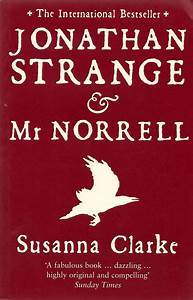
One of my perennial favorites, this novel is the perfect mixture of fantasy and so-called "literary" fiction. It blends the humor and social commentary of authors like Austen and Dickens with the magic of Tolkien. It has spiritual, moral, and emotional depth. It features creepy, dangerous fairies and magicians who have no idea what they're doing. It has copious amounts of footnotes that actually build on the story at hand.
The Sword in the Stone
Otherwise known as the best thing T.H. White ever wrote. This is the story that (very very loosely) inspired the Disney film (which I still love because of Merlin). Merlin tutors young Arthur (and sometimes Kay as well) in all manner of subjects, attempting to ready him for his eventual (and unknown to him) kingship. It's one of the first fantasy stories I can remember, and it sparked my lifelong love of that magus supreme, Merlin.
The Chronicles of Narnia
This is no surprise to anyone, and before you argue that it's seven books: I have an omnibus edition on my shelf. It's one book. So there.
Anyway, these books never cease to offer up something more when I come back to them. They have been an encouragement to me in low times and have helped shape my imagination.
Uprooted
This is a more recent addition to this list, but ever since I first read this book last year, I haven't been able to keep the story out of my mind. It has magic and folklore, romance and intrigue, and a plot that keeps you guessing the whole way through.
Till We Have Faces
Another fairy-tale story and one of Lewis's classics, Till We Have Faces may say more about a person's spiritual journey than almost anything else I've read by him. It also operates in many ways as a working out of some ideas Lewis puts forth in The Four Loves.
The Lord of the Rings
This book, like Narnia, is no surprise. (And yes, it is one novel; silly publishers and their need to break things up.) ((Though if someone could release an omnibus of this, The Hobbit, and The Silmarillion, I would be most grateful.)) I have to go back and reread this every few years because it's just so dear to my heart and soul.
Plenilune
I first read Plenilune a couple of years ago. (I remember because I wanted to start reading it the day our nephew was born, but had forgotten to load it on my Kindle, and therefore wound up reading The Paper Magician first.) From the first chapters, I loved this world and the richness of the prose. If Jonathan Strange and Mr Norrell is the blending of Austen and Tolkien, then Plenilune is the blending of Austen and Edgar Rice Burroughs (without the questionable commentary on genetic superiority). It's filled with allusions to Shakespeare and Scripture and it doesn't mind letting the reader do some work filling in the gaps.
The Celtic Way of Prayer
What? A nonfiction book on this list? Well, at least it's Celtic.
I'm just kidding. This book was recommended to me a few years back and it left a strong impression. If ever I feel like I need to put more prayer and song in my life, this is the book I think of to help me do it.
The Four Loves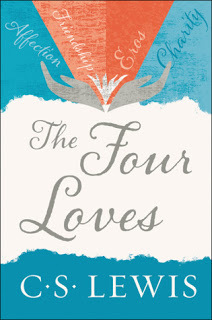
Yes, three C.S. Lewis books is a lot for a 10-book list. But the man shaped me as a writer and a reader. This book helped me understand love in a multi-faceted way, and seeing the expressions of the ideas contained here pop up in his fiction makes it that much more notable.
Something Wicked This Way Comes
No list like this would be complete without the other author who shaped me as a writer, Ray Bradbury. The man could write poetry in the form of a story, and he knew how to capture nostalgia in all its beautiful and terrible aspects. He may not have invented the creepy circus trope, but he certainly excelled at it.
What are some of your top books of all time? Tell me about them in the comments!
Only I haven't actually done a top 10 books post. I've done posts on my top 10 books to reread, top 10 fantasy books, top 10 non-fantasy/sci-fi books, and even top 100-ish books. So today I'm going to do a Top 10 Books post, with an emphasis on why these books have stayed with me. These are the books that I would choose if I had to choose only ten books to be able to read for the rest of my life.
Jonathan Strange and Mr Norrell

One of my perennial favorites, this novel is the perfect mixture of fantasy and so-called "literary" fiction. It blends the humor and social commentary of authors like Austen and Dickens with the magic of Tolkien. It has spiritual, moral, and emotional depth. It features creepy, dangerous fairies and magicians who have no idea what they're doing. It has copious amounts of footnotes that actually build on the story at hand.
The Sword in the Stone

Otherwise known as the best thing T.H. White ever wrote. This is the story that (very very loosely) inspired the Disney film (which I still love because of Merlin). Merlin tutors young Arthur (and sometimes Kay as well) in all manner of subjects, attempting to ready him for his eventual (and unknown to him) kingship. It's one of the first fantasy stories I can remember, and it sparked my lifelong love of that magus supreme, Merlin.
The Chronicles of Narnia

This is no surprise to anyone, and before you argue that it's seven books: I have an omnibus edition on my shelf. It's one book. So there.
Anyway, these books never cease to offer up something more when I come back to them. They have been an encouragement to me in low times and have helped shape my imagination.
Uprooted

This is a more recent addition to this list, but ever since I first read this book last year, I haven't been able to keep the story out of my mind. It has magic and folklore, romance and intrigue, and a plot that keeps you guessing the whole way through.
Till We Have Faces

Another fairy-tale story and one of Lewis's classics, Till We Have Faces may say more about a person's spiritual journey than almost anything else I've read by him. It also operates in many ways as a working out of some ideas Lewis puts forth in The Four Loves.
The Lord of the Rings

This book, like Narnia, is no surprise. (And yes, it is one novel; silly publishers and their need to break things up.) ((Though if someone could release an omnibus of this, The Hobbit, and The Silmarillion, I would be most grateful.)) I have to go back and reread this every few years because it's just so dear to my heart and soul.
Plenilune

I first read Plenilune a couple of years ago. (I remember because I wanted to start reading it the day our nephew was born, but had forgotten to load it on my Kindle, and therefore wound up reading The Paper Magician first.) From the first chapters, I loved this world and the richness of the prose. If Jonathan Strange and Mr Norrell is the blending of Austen and Tolkien, then Plenilune is the blending of Austen and Edgar Rice Burroughs (without the questionable commentary on genetic superiority). It's filled with allusions to Shakespeare and Scripture and it doesn't mind letting the reader do some work filling in the gaps.
The Celtic Way of Prayer

What? A nonfiction book on this list? Well, at least it's Celtic.
I'm just kidding. This book was recommended to me a few years back and it left a strong impression. If ever I feel like I need to put more prayer and song in my life, this is the book I think of to help me do it.
The Four Loves

Yes, three C.S. Lewis books is a lot for a 10-book list. But the man shaped me as a writer and a reader. This book helped me understand love in a multi-faceted way, and seeing the expressions of the ideas contained here pop up in his fiction makes it that much more notable.
Something Wicked This Way Comes

No list like this would be complete without the other author who shaped me as a writer, Ray Bradbury. The man could write poetry in the form of a story, and he knew how to capture nostalgia in all its beautiful and terrible aspects. He may not have invented the creepy circus trope, but he certainly excelled at it.
What are some of your top books of all time? Tell me about them in the comments!
Published on April 19, 2018 10:35
April 18, 2018
Coco Review: Family and Creativity
If you've been around me for any length of time, you know I'm usually always late to the game when it comes to keeping up with pop culture. Movies are no exception, even when it comes to movies I'm very excited to see. All of this is to say I've finally seen Disney/Pixar's Coco (and much sooner than I usually see movies after they've left theaters). There are spoilers ahead, but I've done my level best to keep them vague in regard to BIG TWISTS out of respect for those who (like me) are late to the game.

If you're unfamiliar with the movie, Coco is about a boy named Miguel whose family has forbidden music for generations -- all because his great-great-grandfather (a musician) left town and never came back. Not to be undone by his betrayal, his wife, Imelda, decided to support her family by becoming a successful shoemaker, a business the entire family continues to operate today. There's only one problem: Miguel loves music, especially the songs of the famous Ernesto de la Cruz. Miguel has video of de la Cruz's movies, television appearances, and songs, and has even decorated a secret guitar in the manner of de la Cruz's famous instrument.
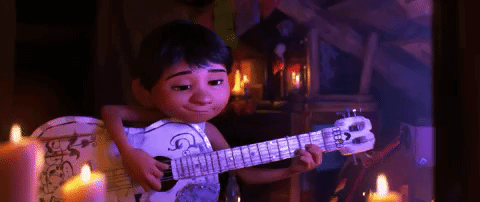
Though he loves his family, Miguel can't seem to reconcile their hatred for music with his own passion. As the Day of the Dead approaches, he finds himself torn between honoring his family's wishes (and, in keeping with the holiday, the dead members of his family) and pursuing his chance to play in a local music competition. When he breaks into de la Cruz's mausoleum to borrow the famous guitar, Miguel finds himself transported into the Land of the Dead. In order to return to the living world, he must obtain his family's blessing. The problem being that only Imelda will give the blessing, and only if he gives up music forever. Unhappy with this offer, Miguel sets off to find his great-great-grandfather, who he is sure will give him a family blessing without strings (or perhaps with guitar strings).
As someone who has grown up with Pixar films, I've come to expect a lot from their stories. Whether it's Toy Story, The Incredibles, Up, Brave, or Inside Out, I know I'm in for a moving, character-driven story. Coco is no exception to this. Miguel's struggle feels incredibly close for me because although I've been blessed with family that supports my creativity, I know this is not always the case. Whether in family relationships or the business world, creativity is often seen as a stepchild to more "useful" or "practical" skills. (Never mind that creativity and imagination are required for scientific endeavors as well.)
This isn't to say that Miguel is portrayed as the noble artist struggling to overcome the ignorance of those around him. It's clear from the first act of the film that Miguel needs his family's practicality to ground him as much as they need his creativity to free them. When Miguel notices de la Cruz's guitar in a faceless picture of his great-great-grandfather (Imelda was resolute that her husband be forgotten completely), he latches onto the idea that de la Cruz is his great-great-grandfather and uses this belief to justify his rebellion against his family's wishes. Miguel may be the protagonist of the movie, but he has a lot of maturing to do.
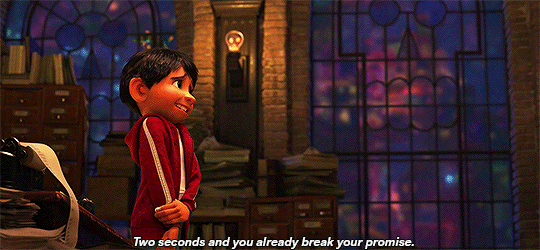
This wouldn't be a Pixar film if it didn't have at least one heart-crushing scene, and Coco has several: the scene when Miguel's guitar is destroyed by his angry abuelita (grandmother), spurring Miguel to run away; when Hector's friend vanishes because no one on Earth still remembers him; when the truth behind Hector's death is revealed; when Miguel thinks all is lost; when Hector is on the brink of vanishing; when Miguel returns to the living world and tries to reach Mama Coco with music.
Guys, I don't usually cry or tear up in movies, but Pixar tends to be the exception to that (the beginning of Up, anyone? Or Bing-Bong?). I teared up multiple times in this movie. Despite having some of the twists spoiled for me and my wife and I calling some of the others, I still found myself moved by the emotion of the journey. That's just good storytelling.
And lest I give you the wrong impression, this movie is also full of humor, including may Frida Kahlo references and this scene:
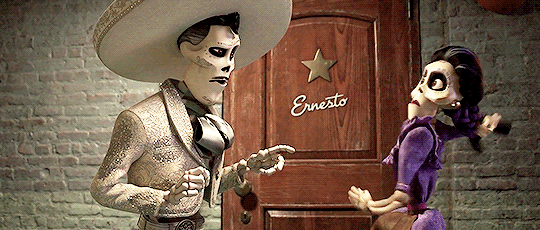
In the end, the message of Coco is not "Family is important" or "Follow your dreams." It avoids going the route of cliche Disneyfied morals in that respect. The message is more like "Families need dreams and dreamers need their families." Miguel has to learn that his family (past and present) is important and worthy of respect. His family has to learn that holding a grudge for decades only poisons you; it does not strengthen you. There is a joy in this movie in seeing relationships mended and wrongs set right. It does not condone paying back evil for evil (though it does take some joy in seeing the villain get his comeuppance). In short, it's a movie that I think is needed today. If you haven't seen Coco, do so.
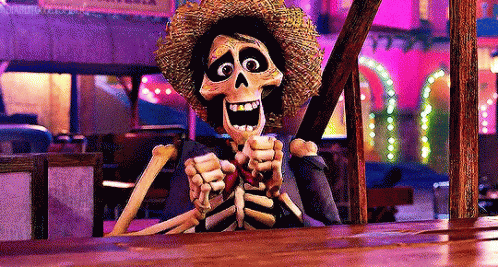
Have you seen Coco? What did you think? Let me know in the comments.

If you're unfamiliar with the movie, Coco is about a boy named Miguel whose family has forbidden music for generations -- all because his great-great-grandfather (a musician) left town and never came back. Not to be undone by his betrayal, his wife, Imelda, decided to support her family by becoming a successful shoemaker, a business the entire family continues to operate today. There's only one problem: Miguel loves music, especially the songs of the famous Ernesto de la Cruz. Miguel has video of de la Cruz's movies, television appearances, and songs, and has even decorated a secret guitar in the manner of de la Cruz's famous instrument.

Though he loves his family, Miguel can't seem to reconcile their hatred for music with his own passion. As the Day of the Dead approaches, he finds himself torn between honoring his family's wishes (and, in keeping with the holiday, the dead members of his family) and pursuing his chance to play in a local music competition. When he breaks into de la Cruz's mausoleum to borrow the famous guitar, Miguel finds himself transported into the Land of the Dead. In order to return to the living world, he must obtain his family's blessing. The problem being that only Imelda will give the blessing, and only if he gives up music forever. Unhappy with this offer, Miguel sets off to find his great-great-grandfather, who he is sure will give him a family blessing without strings (or perhaps with guitar strings).
As someone who has grown up with Pixar films, I've come to expect a lot from their stories. Whether it's Toy Story, The Incredibles, Up, Brave, or Inside Out, I know I'm in for a moving, character-driven story. Coco is no exception to this. Miguel's struggle feels incredibly close for me because although I've been blessed with family that supports my creativity, I know this is not always the case. Whether in family relationships or the business world, creativity is often seen as a stepchild to more "useful" or "practical" skills. (Never mind that creativity and imagination are required for scientific endeavors as well.)
This isn't to say that Miguel is portrayed as the noble artist struggling to overcome the ignorance of those around him. It's clear from the first act of the film that Miguel needs his family's practicality to ground him as much as they need his creativity to free them. When Miguel notices de la Cruz's guitar in a faceless picture of his great-great-grandfather (Imelda was resolute that her husband be forgotten completely), he latches onto the idea that de la Cruz is his great-great-grandfather and uses this belief to justify his rebellion against his family's wishes. Miguel may be the protagonist of the movie, but he has a lot of maturing to do.

This wouldn't be a Pixar film if it didn't have at least one heart-crushing scene, and Coco has several: the scene when Miguel's guitar is destroyed by his angry abuelita (grandmother), spurring Miguel to run away; when Hector's friend vanishes because no one on Earth still remembers him; when the truth behind Hector's death is revealed; when Miguel thinks all is lost; when Hector is on the brink of vanishing; when Miguel returns to the living world and tries to reach Mama Coco with music.
Guys, I don't usually cry or tear up in movies, but Pixar tends to be the exception to that (the beginning of Up, anyone? Or Bing-Bong?). I teared up multiple times in this movie. Despite having some of the twists spoiled for me and my wife and I calling some of the others, I still found myself moved by the emotion of the journey. That's just good storytelling.
And lest I give you the wrong impression, this movie is also full of humor, including may Frida Kahlo references and this scene:

In the end, the message of Coco is not "Family is important" or "Follow your dreams." It avoids going the route of cliche Disneyfied morals in that respect. The message is more like "Families need dreams and dreamers need their families." Miguel has to learn that his family (past and present) is important and worthy of respect. His family has to learn that holding a grudge for decades only poisons you; it does not strengthen you. There is a joy in this movie in seeing relationships mended and wrongs set right. It does not condone paying back evil for evil (though it does take some joy in seeing the villain get his comeuppance). In short, it's a movie that I think is needed today. If you haven't seen Coco, do so.

Have you seen Coco? What did you think? Let me know in the comments.
Published on April 18, 2018 07:01
April 12, 2018
Watercolor Wednesday: Narnia and AprilFae
I know I'm late with this month's art post. I haven't been as actively computering this week and it's always slipped my mind when I've been active. So here we are. I did a couple of Narnia paintings centered around Shasta and joined the April Fae art challenge on Instagram, so I've been very steadily making paintings and drawings for the last two weeks. I also did some prep sketches for the next couple 100 Myths drawings, but I'm saving those for once the final versions are done, probably after April Fae is over.
First up, the Shasta series.
This first one is a rendition of Shasta's night among the tombs of the ancient kings of Calormene. Note the cat keeping him company.
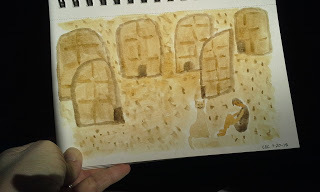
I loved the colors in that one so much I wanted to do a portrait of Shasta with the same scheme. But first, a practice sketch.
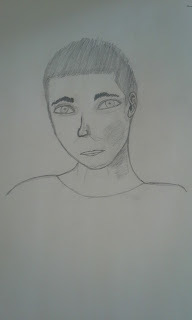
Then the colorized version:

Day one of April Fae was the Fool, so I drew a Faerie hunter who felt foolish for taking a bet.
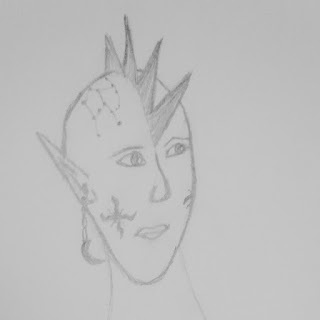
Day two was Titania, so I painted the Faerie queen as she appears in Albion Academy.
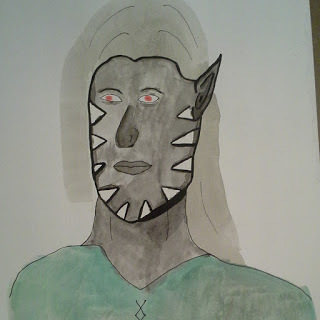
Day three was moon, so I did a line art drawing based on the poem I wrote that day. (Did I mention I'm also doing a poem-a-day challenge this month?)
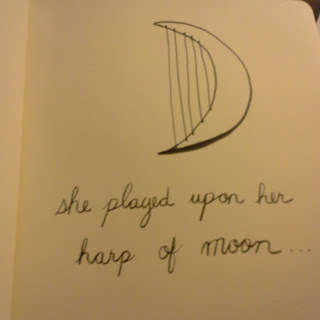
Day four was "her eyes were wild" so we have a Fae girl with wildflowers for eyes.
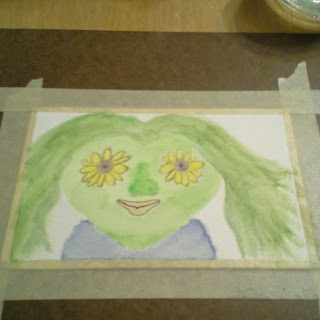
I didn't get to paint on day five, so for "poison" I drew a Poison Ivan who hangs around the poison ivy plants.
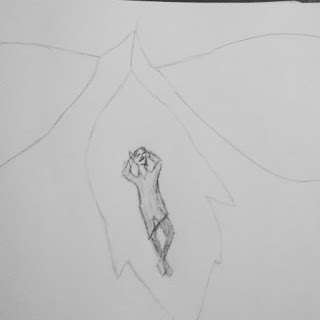
Day six was the Lady of the Lake, and I wound up going a different direction than I intended. She's kind of a mermaid/kelpie looking thing rather than your traditional enchantress.
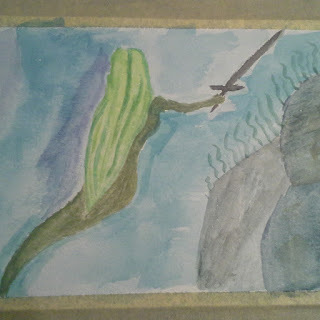
Day seven's prompt was "Godmother" and I of course had to do something different. I did a fairy godfather inspired by Murray, Martin Short's character in A Simple Wish. He also came out a bit dryadic.

Day eight was Jenny Greenteeth, and I got to practice drawing something creepy while taking inspiration from The Oh Hellos. That's a win, right?
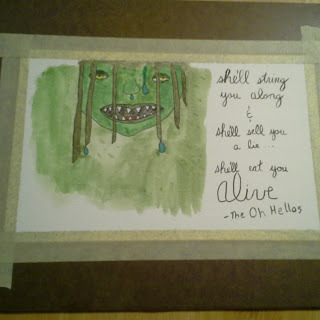
Day nine was "the veils are thin," and after floundering around with that idea for a while, I got the day's poem written, and the poem inspired a painting. So double challenge for the win.

Day ten was the Oak King, and I didn't get a decent prep sketch done that day, so I free-handed the figure and quickly reminded myself why I prefer having a good sketch done first. I did get some hand lettering in, along with a fun oak leaf in the corner and the crown/tattoo design came out great.
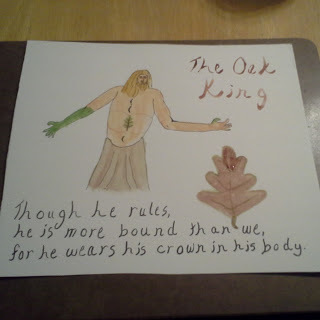
Day eleven was the Holly King, and once I got my concept sketch done, I kept going with more possibilities, so we have a whole royal family of Hollys.
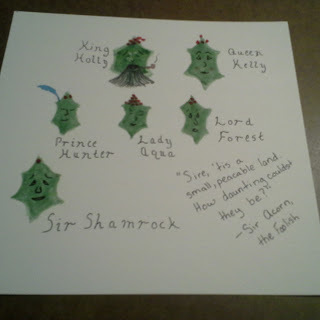
I may do another art post later this month with more April Fae pictures, but if not, the rest will be in next month's post. Are there any that you want to see me do more paintings in that style? Are there some you'd like to see me tackle again? Let me know in the comments.
First up, the Shasta series.
This first one is a rendition of Shasta's night among the tombs of the ancient kings of Calormene. Note the cat keeping him company.

I loved the colors in that one so much I wanted to do a portrait of Shasta with the same scheme. But first, a practice sketch.

Then the colorized version:

Day one of April Fae was the Fool, so I drew a Faerie hunter who felt foolish for taking a bet.

Day two was Titania, so I painted the Faerie queen as she appears in Albion Academy.

Day three was moon, so I did a line art drawing based on the poem I wrote that day. (Did I mention I'm also doing a poem-a-day challenge this month?)

Day four was "her eyes were wild" so we have a Fae girl with wildflowers for eyes.

I didn't get to paint on day five, so for "poison" I drew a Poison Ivan who hangs around the poison ivy plants.

Day six was the Lady of the Lake, and I wound up going a different direction than I intended. She's kind of a mermaid/kelpie looking thing rather than your traditional enchantress.

Day seven's prompt was "Godmother" and I of course had to do something different. I did a fairy godfather inspired by Murray, Martin Short's character in A Simple Wish. He also came out a bit dryadic.

Day eight was Jenny Greenteeth, and I got to practice drawing something creepy while taking inspiration from The Oh Hellos. That's a win, right?

Day nine was "the veils are thin," and after floundering around with that idea for a while, I got the day's poem written, and the poem inspired a painting. So double challenge for the win.

Day ten was the Oak King, and I didn't get a decent prep sketch done that day, so I free-handed the figure and quickly reminded myself why I prefer having a good sketch done first. I did get some hand lettering in, along with a fun oak leaf in the corner and the crown/tattoo design came out great.

Day eleven was the Holly King, and once I got my concept sketch done, I kept going with more possibilities, so we have a whole royal family of Hollys.

I may do another art post later this month with more April Fae pictures, but if not, the rest will be in next month's post. Are there any that you want to see me do more paintings in that style? Are there some you'd like to see me tackle again? Let me know in the comments.
Published on April 12, 2018 17:45
April 9, 2018
Beautiful People: Favorites Edition
Beautiful People is a blog link-up hosted by Paper Fury and Further Up and Further In. This is the last edition (for now), and it's all about favorites!

1. Favorite genre to write in?
Fantasy for sure. I occasionally write something sci-fi-ish or horror, but fantasy is where I belong.
2. What book (a real actual published book!) do you think your character would benefit from reading?
Mortimer should probably read Uprooted. Merlin would benefit from Narnia. Bryn should probably read The Book Thief.
3. Favorite piece of dialogue you’ve written?
You mean I have to choose? Robin's conversation with Vivienne from Albion Academy is probably at the top of the list. It's one of the earliest snippets from that book and really helped me define their characters.
4. What did your character want to be when they grew up, and what did they actually become?
Merlin wanted to be anything but a wizard. I don't think that's working out for him so far. Bryn wanted to be a Valkyrie, and . . . well, if you've read Albion Academy, you know how that's going. Mortimer didn't really have "when I grow up"-style dreams per se, but he did want to be a spectacular Djinni. I'd say he's off to a pretty good start.
5. Favorite character name(s)?
I'm a bit proud of Merlin's middle name, Marcellus. It just adds such a weight to any instance his full name gets used. I also like Gabriel Faust (especially when I think he was almost Melman Goode *shudders*). Alamar Stone was another fun one to pull together. And let's not forget Spork.
6. What makes your character feel loved, and who was the last person to make them feel that way?
Mortimer feels loved when he doesn't feel like people see Djinni first, Mortimer second. The last time he felt this way was whenever he last hung out with Bryn and Merlin.
Merlin feels loved whenever Kaya calls him Anaia, when Harry treats him like a normal person, and the rare occasions when his mother doesn't make her praise hinge on Merlin's magical prowess. The
first two happen most days, but the latter only happens once or twice in Albion Academy.
Bryn feels loved when she connects with others either physically or through a shared activity. When she can spend time with her sisters, go hunting with Thor, or hang out with Merlin and Mortimer, she feels loved.
7. Favorite character you’ve ever written?
This is one of those "depends on the day" kind of questions. Usually, my favorite character is the one I've just finished writing. But the characters that I have the most fun writing are usually Belchor and Robin because they can get away with almost anything. Ariel Isamu from There's No Place Like Home? is also a favorite.
8. If your character were permanently leaving town, what would they easily throw out? What would they refuse to part with? (Why?)
Mortimer wouldn't need much. He'd probably keep his wand and nothing else if push came to shove. Merlin would take his Book, ring, and staff and the picture of him and Kaya from her tenth birthday where he tried to levitate her cake and wound up making it explode. Bryn would take a spear, her wand, and her Valkyrie badge.
9. Favorite tropes to write!
I'm terrible at knowing what tropes I write, but I do a lot of kitchen sink mythology in the Albion books and I love seeing that sort of trope in fiction. I'm also a fan of tragic backstories and redemption arcs.
10. Which story has your heart and won't let go?
As far as stories that need to be written? The rest of the Albion series, its sister series the Shadow Quartet, and Ashes and Dust, my urban phoenix/vampire story. (There are lots more, but these are the ones shouting the loudest right now.)
As far as stories I've read/watched that won't let go: Narnia, Till We Have Faces, Beauty and the Beast, The Lord of the Rings (and Middle-earth in general), The Princess Bride, Jonathan Strange and Mr Norrell, Uprooted, Watership Down, Aladdin, Ladyhawke . . . I could go on and on.
11. Favorite relationship between characters you’ve written?
The friendships between Merlin and Harry and Merlin/Mortimer/Bryn are all top for me. There are some relationships that develop in Albion Apparent that take the cake but I won't go into those in detail because
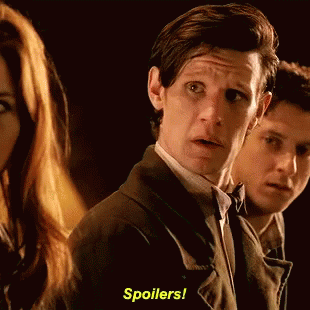
12. Toni Morrison once said, “If there's a book that you want to read, but it hasn't been written yet, then you must write it.” What are the books that you want to see more of, and what “holes” do you think need filling in the literary world?
I really want to see more fiction that inspires bravery on an everyday level. Fiction that promotes characters mending friendships and relationships of all kinds rather than discarding them because they don't want to put in the effort to work past the other person's flaws. Stories that make the soul sing and imbue a sense of awe, wonder, and joy.
13. Favorite Pinterest board/aesthetic for a book?
I'm terrible about keeping my Pinterest boards organized and sleek, but my Albion board tends to get the most love.
14. Favorite time periods & settings to work with?
I tend to work with more or less contemporary time periods, but I like using secondary world settings where I can play with the landscape, plant/animal life, and magic in new ways. Even if we don't get as much of that in the Albion books.
15. When people are done reading your book, what feeling do you want them to come away with?
I want readers to come away from any of my books feeling they've just experienced something worthwhile. If I've given them something to feel joyful about or cry about or get angry (in a good way) about, I've done my job. If they also have a reason to think about the themes and events of the stories afterward, or better yet go back to read the stories again, I've done my job well.
With Albion Academy , I want readers to know they're not alone in this world and that true friendships exist. I want them to know that forgiveness is possible.
Thanks for joining me today! If you want to see what other folks' responses are, check out the link-up here. (And if you have a favorite from Albion Academy that didn't get mentioned, tell me what it is!)

1. Favorite genre to write in?
Fantasy for sure. I occasionally write something sci-fi-ish or horror, but fantasy is where I belong.
2. What book (a real actual published book!) do you think your character would benefit from reading?
Mortimer should probably read Uprooted. Merlin would benefit from Narnia. Bryn should probably read The Book Thief.
3. Favorite piece of dialogue you’ve written?
You mean I have to choose? Robin's conversation with Vivienne from Albion Academy is probably at the top of the list. It's one of the earliest snippets from that book and really helped me define their characters.
4. What did your character want to be when they grew up, and what did they actually become?
Merlin wanted to be anything but a wizard. I don't think that's working out for him so far. Bryn wanted to be a Valkyrie, and . . . well, if you've read Albion Academy, you know how that's going. Mortimer didn't really have "when I grow up"-style dreams per se, but he did want to be a spectacular Djinni. I'd say he's off to a pretty good start.
5. Favorite character name(s)?
I'm a bit proud of Merlin's middle name, Marcellus. It just adds such a weight to any instance his full name gets used. I also like Gabriel Faust (especially when I think he was almost Melman Goode *shudders*). Alamar Stone was another fun one to pull together. And let's not forget Spork.
6. What makes your character feel loved, and who was the last person to make them feel that way?
Mortimer feels loved when he doesn't feel like people see Djinni first, Mortimer second. The last time he felt this way was whenever he last hung out with Bryn and Merlin.
Merlin feels loved whenever Kaya calls him Anaia, when Harry treats him like a normal person, and the rare occasions when his mother doesn't make her praise hinge on Merlin's magical prowess. The
first two happen most days, but the latter only happens once or twice in Albion Academy.
Bryn feels loved when she connects with others either physically or through a shared activity. When she can spend time with her sisters, go hunting with Thor, or hang out with Merlin and Mortimer, she feels loved.
7. Favorite character you’ve ever written?
This is one of those "depends on the day" kind of questions. Usually, my favorite character is the one I've just finished writing. But the characters that I have the most fun writing are usually Belchor and Robin because they can get away with almost anything. Ariel Isamu from There's No Place Like Home? is also a favorite.
8. If your character were permanently leaving town, what would they easily throw out? What would they refuse to part with? (Why?)
Mortimer wouldn't need much. He'd probably keep his wand and nothing else if push came to shove. Merlin would take his Book, ring, and staff and the picture of him and Kaya from her tenth birthday where he tried to levitate her cake and wound up making it explode. Bryn would take a spear, her wand, and her Valkyrie badge.
9. Favorite tropes to write!
I'm terrible at knowing what tropes I write, but I do a lot of kitchen sink mythology in the Albion books and I love seeing that sort of trope in fiction. I'm also a fan of tragic backstories and redemption arcs.
10. Which story has your heart and won't let go?
As far as stories that need to be written? The rest of the Albion series, its sister series the Shadow Quartet, and Ashes and Dust, my urban phoenix/vampire story. (There are lots more, but these are the ones shouting the loudest right now.)
As far as stories I've read/watched that won't let go: Narnia, Till We Have Faces, Beauty and the Beast, The Lord of the Rings (and Middle-earth in general), The Princess Bride, Jonathan Strange and Mr Norrell, Uprooted, Watership Down, Aladdin, Ladyhawke . . . I could go on and on.
11. Favorite relationship between characters you’ve written?
The friendships between Merlin and Harry and Merlin/Mortimer/Bryn are all top for me. There are some relationships that develop in Albion Apparent that take the cake but I won't go into those in detail because

12. Toni Morrison once said, “If there's a book that you want to read, but it hasn't been written yet, then you must write it.” What are the books that you want to see more of, and what “holes” do you think need filling in the literary world?
I really want to see more fiction that inspires bravery on an everyday level. Fiction that promotes characters mending friendships and relationships of all kinds rather than discarding them because they don't want to put in the effort to work past the other person's flaws. Stories that make the soul sing and imbue a sense of awe, wonder, and joy.
13. Favorite Pinterest board/aesthetic for a book?
I'm terrible about keeping my Pinterest boards organized and sleek, but my Albion board tends to get the most love.
14. Favorite time periods & settings to work with?
I tend to work with more or less contemporary time periods, but I like using secondary world settings where I can play with the landscape, plant/animal life, and magic in new ways. Even if we don't get as much of that in the Albion books.
15. When people are done reading your book, what feeling do you want them to come away with?
I want readers to come away from any of my books feeling they've just experienced something worthwhile. If I've given them something to feel joyful about or cry about or get angry (in a good way) about, I've done my job. If they also have a reason to think about the themes and events of the stories afterward, or better yet go back to read the stories again, I've done my job well.
With Albion Academy , I want readers to know they're not alone in this world and that true friendships exist. I want them to know that forgiveness is possible.
Thanks for joining me today! If you want to see what other folks' responses are, check out the link-up here. (And if you have a favorite from Albion Academy that didn't get mentioned, tell me what it is!)
Published on April 09, 2018 07:06
April 3, 2018
Top 10 Tuesday: Fictional Old People
Today is a special day in my family: it's both my grandmothers' birthday. In honor of that, I wanted to do a top 10 fictional grandparents post, but given the shortage of fictional grandparents that came to mind, I expanded the post to include non-grandparent characters who are also in a mentoring/parental relationship with characters who are at least 1 generation younger than they are.
Grandma Fa (Mulan)
The original Disney #GrandmaGoals, Grandma Fa is the old person many of us aspire to be. She speaks her mind, isn't afraid to sass off about the ancestors' lack of luck ("They're dead."), and loves her family deeply.
Gramma Tala (Moana)
The Disney #GrandmaGoals of the latest generation, Tala isn't afraid of her reputation as the village crazy lady. In fact, she embraces it. She's also the village's storyteller, passing on her knowledge of her people's history and culture to the younger generations. She doesn't let Moana forget her past or her destiny, and she does it with verve and heart to match any grandmother out there.
Uncle Iroh (Avatar: The Last Airbender)
The real reason I couldn't leave this list at just grandparents, Iroh is one of the best characters in the Avatar universe. He is wise, but not incapable of being foolish for those he loves. He is strong, but finds his strength in wisdom rather than force. He cares for his nephew when no one else sees anything of value in Zuko. And even when things look bleakest, he still has hope for the future.
Matthew and Marilla Cuthbert (Anne of Green Gables)
Though they are old, unmarried siblings hoping to adopt a boy who can help Matthew around the farm, Matthew and Marilla rise to the occasion when they're sent red-headed Anne by mistake. Matthew takes to Anne right away, treating her like the daughter he never had. Marilla, once she accepts the idea of Anne's eccentric personality being a fixture at Green Gables, does much the same. By the end of the first story, you can't imagine Anne without Matthew and Marilla, or them without her. Their love for one another is as strong as can be.
Galadriel (The Lord of the Rings)
Fun fact: Galadriel is actually Arwen's grandmother. In addition to her other duties as one of the most powerful Elves in Middle-earth, she takes an interest in her grandchild's romantic prospects. She gives Aragorn hope (for himself and for his future) when the Fellowship passes through Lorien. She makes certain that they have what they need in order to live long and happy lives together. (The fact that she also gives Frodo a gift that saves the quest to destroy the Ring doesn't hurt matters, either.)
Gandalf (The Hobbit and The Lord of the Rings)
While Gandalf is not (as far as Tolkien ever stated) a parent or grandparent, his interest in Bilbo, Frodo, and the younger hobbits of the story gives him a place on this list. Heart-wrenching memes connecting Fili and Kili with Merry and Pippin aside, Gandalf truly cares about his small charges; for proof, look no further than the snarky, "If you don't like my burglar, at least don't damage him!" in The Hobbit or his restrained anger at the Mouth of Sauron's words in The Return of the King. He may be a grumpy old wizard, but he's our grumpy old wizard.
Professor Digory Kirke (The Lion, the Witch, and the Wardrobe)
Professor Kirke at first seems to be just another minor character in the backdrop of the Pevensies' journey into Narnia. But as the later book reveal, he maintains his connection with the four siblings, tutoring Peter for his exams and making sure the friends of Narnia are able to get together for moral support. He treats them like family and takes an interest in their educations. He becomes more like Uncle Digory than the Professor by the end.
Professor Minerva McGonagall (The Harry Potter books)
If McGonagall is not your favorite Hogwarts professor, we may need to have a discussion. She's stern and sassy and cares deeply about her students, their wellbeing, and their education. She does not tolerate foolishness (looking at you, Gilderoy Lockhart), or incompetence (*cough*Umbridge*cough*). Also, she can turn into a cat. And she's portrayed by the incomparable Dame Maggie Smith. Why wouldn't she be one of your favorite old people?
Ninny Threadgoode (Fried Green Tomatoes)
Before I knew of McGonagall's existence, I had been introduced to Ninny Threadgoode. She is not the hardcore, defending Hogwarts with statuary type old person that McGonagall is. Instead, she is an older woman who takes the time to help a younger (than her) woman through some self-searching difficulties in her life. She isn't above stating the obvious and expressing concern, and she has her own insecurities to deal with. But Ninny is not a ninny. She's a faithful, caring person who doesn't stop caring just because life gets hard and things change.
Cipur (Willy the Sparrow)
This entry probably comes from the most unknown story on this list. Willy the Sparrow is an animated film from the '90s about a boy who likes to scare and torment the animals around him. As punishment, he's turned into a sparrow to see life from their perspective. One of the characters who helps him on his way is an older sparrow named Cipur. Cipur loves knowledge and the resourcefulness of humans, so much so that he'd love to be human. He's cranky and not always the most patient, but he cares deeply about those around him. It is a testament to his love of knowledge and others that when he feels betrayed by Willy and turns his back on the boy, Willy refuses to let Cipur make an even bigger mistake and helps the old sparrow get home despite the storm threatening to ground them both. Cipur, like my own grandfather, leaves his charges with the ideal to "never stop learning." And that makes him worthy of this list.
Who are some of your favorite grandparents, mentors, and other "old people"? Let me know in the comments!
Grandma Fa (Mulan)
The original Disney #GrandmaGoals, Grandma Fa is the old person many of us aspire to be. She speaks her mind, isn't afraid to sass off about the ancestors' lack of luck ("They're dead."), and loves her family deeply.
Gramma Tala (Moana)
The Disney #GrandmaGoals of the latest generation, Tala isn't afraid of her reputation as the village crazy lady. In fact, she embraces it. She's also the village's storyteller, passing on her knowledge of her people's history and culture to the younger generations. She doesn't let Moana forget her past or her destiny, and she does it with verve and heart to match any grandmother out there.
Uncle Iroh (Avatar: The Last Airbender)
The real reason I couldn't leave this list at just grandparents, Iroh is one of the best characters in the Avatar universe. He is wise, but not incapable of being foolish for those he loves. He is strong, but finds his strength in wisdom rather than force. He cares for his nephew when no one else sees anything of value in Zuko. And even when things look bleakest, he still has hope for the future.
Matthew and Marilla Cuthbert (Anne of Green Gables)
Though they are old, unmarried siblings hoping to adopt a boy who can help Matthew around the farm, Matthew and Marilla rise to the occasion when they're sent red-headed Anne by mistake. Matthew takes to Anne right away, treating her like the daughter he never had. Marilla, once she accepts the idea of Anne's eccentric personality being a fixture at Green Gables, does much the same. By the end of the first story, you can't imagine Anne without Matthew and Marilla, or them without her. Their love for one another is as strong as can be.
Galadriel (The Lord of the Rings)
Fun fact: Galadriel is actually Arwen's grandmother. In addition to her other duties as one of the most powerful Elves in Middle-earth, she takes an interest in her grandchild's romantic prospects. She gives Aragorn hope (for himself and for his future) when the Fellowship passes through Lorien. She makes certain that they have what they need in order to live long and happy lives together. (The fact that she also gives Frodo a gift that saves the quest to destroy the Ring doesn't hurt matters, either.)
Gandalf (The Hobbit and The Lord of the Rings)
While Gandalf is not (as far as Tolkien ever stated) a parent or grandparent, his interest in Bilbo, Frodo, and the younger hobbits of the story gives him a place on this list. Heart-wrenching memes connecting Fili and Kili with Merry and Pippin aside, Gandalf truly cares about his small charges; for proof, look no further than the snarky, "If you don't like my burglar, at least don't damage him!" in The Hobbit or his restrained anger at the Mouth of Sauron's words in The Return of the King. He may be a grumpy old wizard, but he's our grumpy old wizard.
Professor Digory Kirke (The Lion, the Witch, and the Wardrobe)
Professor Kirke at first seems to be just another minor character in the backdrop of the Pevensies' journey into Narnia. But as the later book reveal, he maintains his connection with the four siblings, tutoring Peter for his exams and making sure the friends of Narnia are able to get together for moral support. He treats them like family and takes an interest in their educations. He becomes more like Uncle Digory than the Professor by the end.
Professor Minerva McGonagall (The Harry Potter books)
If McGonagall is not your favorite Hogwarts professor, we may need to have a discussion. She's stern and sassy and cares deeply about her students, their wellbeing, and their education. She does not tolerate foolishness (looking at you, Gilderoy Lockhart), or incompetence (*cough*Umbridge*cough*). Also, she can turn into a cat. And she's portrayed by the incomparable Dame Maggie Smith. Why wouldn't she be one of your favorite old people?
Ninny Threadgoode (Fried Green Tomatoes)
Before I knew of McGonagall's existence, I had been introduced to Ninny Threadgoode. She is not the hardcore, defending Hogwarts with statuary type old person that McGonagall is. Instead, she is an older woman who takes the time to help a younger (than her) woman through some self-searching difficulties in her life. She isn't above stating the obvious and expressing concern, and she has her own insecurities to deal with. But Ninny is not a ninny. She's a faithful, caring person who doesn't stop caring just because life gets hard and things change.
Cipur (Willy the Sparrow)
This entry probably comes from the most unknown story on this list. Willy the Sparrow is an animated film from the '90s about a boy who likes to scare and torment the animals around him. As punishment, he's turned into a sparrow to see life from their perspective. One of the characters who helps him on his way is an older sparrow named Cipur. Cipur loves knowledge and the resourcefulness of humans, so much so that he'd love to be human. He's cranky and not always the most patient, but he cares deeply about those around him. It is a testament to his love of knowledge and others that when he feels betrayed by Willy and turns his back on the boy, Willy refuses to let Cipur make an even bigger mistake and helps the old sparrow get home despite the storm threatening to ground them both. Cipur, like my own grandfather, leaves his charges with the ideal to "never stop learning." And that makes him worthy of this list.
Who are some of your favorite grandparents, mentors, and other "old people"? Let me know in the comments!
Published on April 03, 2018 11:35
April 2, 2018
Monday Musings: The Little White Horse and Au Revoir, Crazy European Chick
With the musicals post last week, I'm sure some of you were wondering if I was still reading. The answer is yes, and I have two books to talk about today: Elizabeth Goudge's The Little White Horse and Joe Schreiber's Au Revoir, Crazy European Chick.
The Little White Horse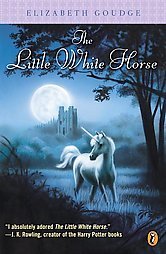
I picked this one up because I wanted to compare it with the film The Secret of Moonacre. While it lacks some of the book's characterization, the film does a surprising job of keeping the themes of pride and repentance. However, the main story is still vastly different. The quarrels in the book are over much smaller and meaner things (like the use of pink geraniums) than in the film (which uses family feuds and heritage to a greater extent).
I enjoyed some of the humor of the story and the character of Robin a great deal. Robin is like a Puckish version of The Secret Garden's Dickon, and his determination that he'll marry Maria is endearing only because she agrees and their both young enough to see the humor of the statement.
Despite these positive elements, I found the overall style of the book less than enthralling. While drawing on the same literary background as The Secret Garden and the Narnia books, The Little White Horse seems to be less interested in letting its characters be real. Maria's failures hardly feel like real setbacks because the book is set from the beginning on her success. She has the aid of more than a couple of preternaturally intelligent animals, and the goodwill of everyone she meets (with the possible exception of the leader of the Men of the Dark Woods, but even he admires her tenacity).
There are a few moments that give me pause, such as the Parson calling the earth our mother in a hymn to God or the cook entering Maria's room while she sleeps to lay out sweets for her. But there are also moments that almost capture the same magic and beauty of Narnia, such as the times when Maria walks with Wrolf through the night or catches sight of the titular horse.
All in all, The Little White Horse is not a bad read, but I don't think I'll come back to it anytime soon.*
*An earlier version of this review first appeared on my Goodreads page.
Au Revoir, Crazy European Chick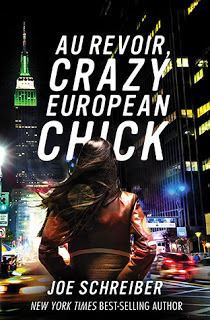
Joe Schreiber's first young adult novel, Au Revoir, Crazy European Chick follows young Perry Stormaire on the eventful night he's forced to take Gobi, the foreign exchange student his family is hosting, to the prom. Turns out, she's not really a foreign exchange student. The truth is that Gobi is an assassin with 5 targets to hit in a single night, and Perry is now her driver, alibi, and accomplice . . . whether he wants to be or not.
What follows is a breakneck thrill ride that doesn't shy away from the harsh realities of Gobi's work or the emotional truths Perry is forced to confront in the course of their evening together. Schreiber's prose is tight and his plotting excellent. If there are fewer surprises to be had than one might expect from such a premise, Schreiber's humorous tone and emotional honesty more than make up for the lack.
Gobi is written in the style of the femme fatale but she displays a fully complex range of emotions, some more subtle than others. Perry's stunned reactionary characterization sticks around only long enough to make his growth into an active person believable. The ending has the right emotional beats to make the preceding story feel complete. If you're a fan of wit, thrills, and unevenly matched duos, you'll probably love this book. (Beware some vulgarity, sexual dialogue, and graphic violence stemming from the nature of the book's subject.)
Have you read either of these books? What did you think of them? Let me know in the comments!
The Little White Horse

I picked this one up because I wanted to compare it with the film The Secret of Moonacre. While it lacks some of the book's characterization, the film does a surprising job of keeping the themes of pride and repentance. However, the main story is still vastly different. The quarrels in the book are over much smaller and meaner things (like the use of pink geraniums) than in the film (which uses family feuds and heritage to a greater extent).
I enjoyed some of the humor of the story and the character of Robin a great deal. Robin is like a Puckish version of The Secret Garden's Dickon, and his determination that he'll marry Maria is endearing only because she agrees and their both young enough to see the humor of the statement.
Despite these positive elements, I found the overall style of the book less than enthralling. While drawing on the same literary background as The Secret Garden and the Narnia books, The Little White Horse seems to be less interested in letting its characters be real. Maria's failures hardly feel like real setbacks because the book is set from the beginning on her success. She has the aid of more than a couple of preternaturally intelligent animals, and the goodwill of everyone she meets (with the possible exception of the leader of the Men of the Dark Woods, but even he admires her tenacity).
There are a few moments that give me pause, such as the Parson calling the earth our mother in a hymn to God or the cook entering Maria's room while she sleeps to lay out sweets for her. But there are also moments that almost capture the same magic and beauty of Narnia, such as the times when Maria walks with Wrolf through the night or catches sight of the titular horse.
All in all, The Little White Horse is not a bad read, but I don't think I'll come back to it anytime soon.*
*An earlier version of this review first appeared on my Goodreads page.
Au Revoir, Crazy European Chick

Joe Schreiber's first young adult novel, Au Revoir, Crazy European Chick follows young Perry Stormaire on the eventful night he's forced to take Gobi, the foreign exchange student his family is hosting, to the prom. Turns out, she's not really a foreign exchange student. The truth is that Gobi is an assassin with 5 targets to hit in a single night, and Perry is now her driver, alibi, and accomplice . . . whether he wants to be or not.
What follows is a breakneck thrill ride that doesn't shy away from the harsh realities of Gobi's work or the emotional truths Perry is forced to confront in the course of their evening together. Schreiber's prose is tight and his plotting excellent. If there are fewer surprises to be had than one might expect from such a premise, Schreiber's humorous tone and emotional honesty more than make up for the lack.
Gobi is written in the style of the femme fatale but she displays a fully complex range of emotions, some more subtle than others. Perry's stunned reactionary characterization sticks around only long enough to make his growth into an active person believable. The ending has the right emotional beats to make the preceding story feel complete. If you're a fan of wit, thrills, and unevenly matched duos, you'll probably love this book. (Beware some vulgarity, sexual dialogue, and graphic violence stemming from the nature of the book's subject.)
Have you read either of these books? What did you think of them? Let me know in the comments!
Published on April 02, 2018 04:00



